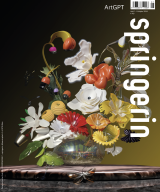Suzana Milevska
is a theorist and curator of visual art and culture from Macedonia. She holds a PhD in visual cultures from Goldsmiths College London. She was a recipient of the Fulbright Senior Research Scholarship and was awared the ALICE Award for Political Curating and Igor Zabel Award for Culture and Theory. Milevska initiated the project “Call the Witness–Roma Pavilion” (Venice Biennale, 2011). She was the first Endowed Professor for Central and South Eastern European Art Histories at the Academy of Fine Art, Vienna.
She is the editor of the reader On Productive Shame, Reconciliation and Agency (SternbergPress, 2016).
Articles
Participatory art
A paradigm shift from objects to subjects
The new tendency towards art that invites the participation of the viewer is both a response to philosophical texts re-defining of the concept of community and the communitarian, and a follow-up to the demand to make visible marginalized groups that have been excluded from public cultural life, argues Suzana Milevska.

